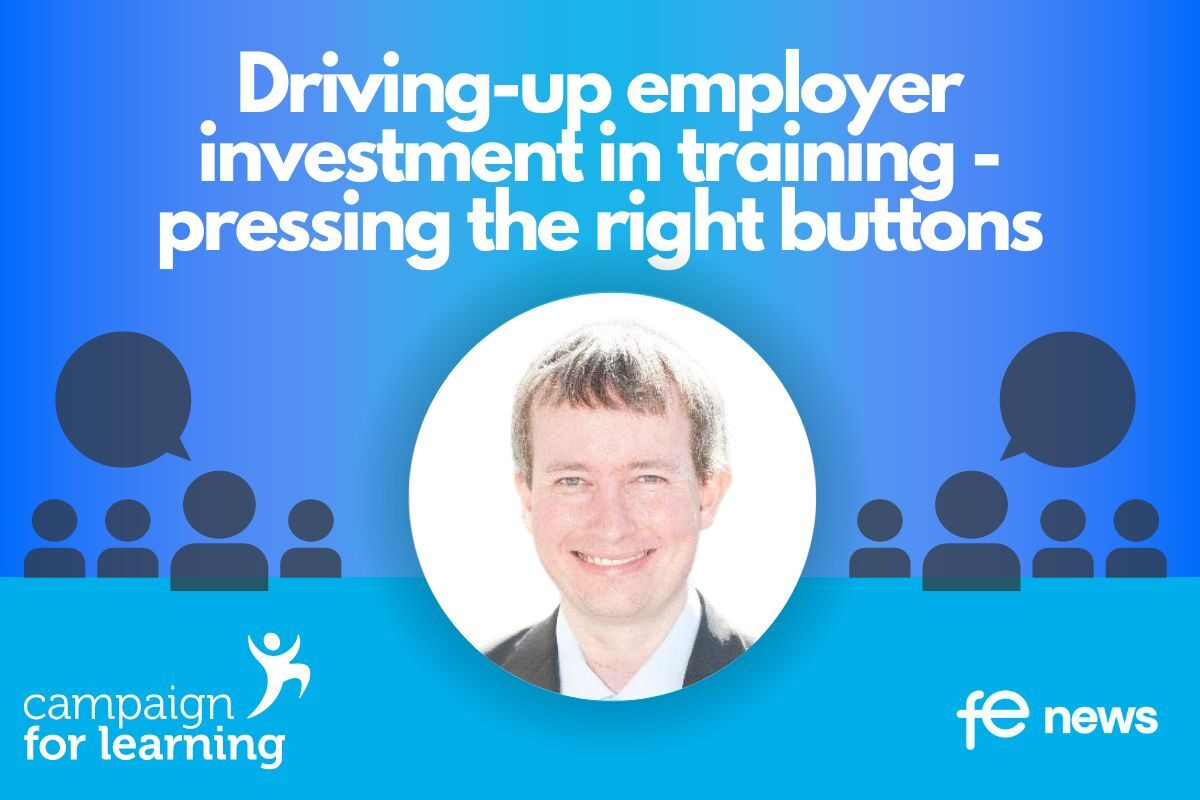Raising employer investment in training

Debates on the role of employers in skills often focus on how the publicly-funded system can best meet their needs. This is important, but we shouldn’t forget that employer’s own investment in training is larger than public investment and that skills need to be used at work in order to boost productivity.
Research by the Learning and Work Institute shows that employers invest half the EU average on training, with the spend per employee falling 28% since 2005.
The best firms invest in their staff, but collectively, we’re falling short. Not only do we invest too little overall, investment is skewed toward those with the highest qualifications; you’re three times more likely to get training at work if you have a degree-level qualification than if you don’t.
This contributes to the UK’s poor productivity performance, limiting businesses ability to make the most of new opportunities and holding back life chances and living standards. There is a big prize to be unlocked.
Falling short
The current situation isn’t through lack of trying. We estimate government support for employer skills amounts to almost £7 billion per year, with a revolving door of initiatives over recent decades.
The main focus today is the apprenticeship system, with large employers paying a levy based on their payrolls that can only be used for apprenticeships and small firms having 95% of apprentice training costs covered. This is a positive step forward, but the way it has been implemented has caused problems.
The idea is that employers choose which apprenticeships they want – but without sufficient incentives to influence their choices, this has led to a fall in opportunities for new starters and those with lower qualifications. The levy system also risks distorting patterns of training, with some employers picking apprenticeships to spend their levy when other forms of training might be more useful in some circumstances – when all you have is a hammer, everything looks like a nail.
In addition to apprenticeships, the Government also provides tax incentives amounting to over £1 billion per year through Corporation Tax and for self-employed people. Again, these passively follow employer choices meaning most of the value goes to training the already highly qualified, as they are more likely to get training from their employer and this training is likely to last longer and cost more.
Raising the bar
It’s clear that current policy hasn’t shifted the dial. In part, this is because employers invest in skills as part of their business strategies – to help them survive and thrive. So, the low growth and high uncertainty of the last decade will have held back employer demand for skills. Part of the answer, then, is a return to greater certainty and a successful plan to grow the economy, including supporting employers to invest in people and capital. But beyond this, current policy is siloed and doesn’t encourage investment throughout the workforce. How to change this?
Reform of the Apprenticeship Levy and the apprenticeship system
First, we should reform the Apprenticeship Levy. Accredited training should be eligible for levy funding because it can make just as much difference. However, widening the training eligible under the levy would increase the risk of overspend or of insufficient funding being left over for small firms’ training.
So this change needs to come as part of a wider set of reforms agreed with employers and trades unions to widen the scope of the levy (either more firms paying it or a higher contribution rate).
We also need to look at completion rates (just over one in two apprentices finishes their apprenticeship), fair access (so career starters get better access) and quality (reducing the high number of apprenticeship standards by broadening their scope in line with other countries).
Reform financial incentives for training
Second, we need better financial incentives for employers to invest in skills. We should replace the current Corporation Tax deduction for training spend, which disproportionately benefits firms investing in their already highly skilled employees. In its place we should introduce a new Skills Tax Credit, modelled on the successful R&D tax credit. This would allow employers to deduct 230% of the cost of accredited training and apprenticeships from their tax liabilities, with a higher rate for businesses employing people in poorer areas or investing in vital skills like digital, numeracy, literacy or green skills.
We should also review the effectiveness of other tax incentives for firms, such as lower employer National Insurance contributions for employing young apprentices.
Recommendation 1
Increasing employer demand for and utilisation of skills needs to be part of a wider plan to grow the economy.
Recommendation 2
The apprenticeship system should be reformed in partnership with employers and trades unions to widen the scope, broaden the training eligible for the UK Apprenticeship Levy, and embed access and quality.
Recommendation 3
The Government should use the Spring Budget to introduce a better targeted system of financial incentives to employers to invest in skills, including a Skills Tax Credit that rewards firms investing in essential skills or employers in lower-income areas.
By Stephen Evans, Chief Executive, Learning and Work Institute
This article is part of Campaign for Learning’s series: ‘Driving-up employer investment in training – pressing the right buttons’.
Part One: Employer investment in context
Part One: Employer investment in context
- Louise Murphy, Economist, Resolution Foundation: Investment in the round
- Dr Vicki Belt, Deputy Director, Enterprise Research Centre, Warwick Business School: UK enterprises and investment in capital and training
- Becci Newton, Director, Public Policy Research, Institute of Employment Studies: Employer investment in training in England
Part Two: Drivers of employer investment in training
- Neil Carberry, Chief Executive, Recruitment and Employment Confederation: Derived demand, British management and employer investment in training
- Ewart Keep, Professor Emeritus, Education Department, University of Oxford: Strategies to drive-up employer investment in training
- Sam Alvis, Head of Economy, Green Alliance: Transitioning to net zero, green skills and employer investment in training
- Dan Lucy, Director of HR, Institute of Employment Studies: Job quality, job design and driving-up employer investment in training
- Natasha Waller, Policy Manager, LEP Network: Local inward investment, business support and employer demand for training
- Jovan Luzajic, Acting Assistant Director of Policy, Universities UK: Universities, R&D, business innovation and meeting employer skills needs
- David Hughes, Chief Executive, Association of Colleges: FE colleges, business innovation and meeting employer skills needs
Part Three: Increasing employer investment in training
- Paul Bivand, Labour Market Consultant: Why should employers invest in training in a flexible labour market?
- Aidan Relf, Skills Consultant: Why should employers invest in training with large net worker migration into the UK?
- Stephen Evans, Chief Executive, Learning and Work Institute: Raising employer investment in training
- Robert West, Head of Education and Skills, CBI: Increasing employer investment in training
- Lizzie Crowley, Skills Policy Adviser, CIPD: Encouraging employer demand for training
- Anthony Painter, Director and Daisy Hooper, Head of Policy and Innovation Chartered Management Institute: Increasing employer demand for management training
Part Four: Raising employer demand for publicly funded post-16 education and skills
- Jane Hickie, Chief Executive, AELP: Increasing employer demand for post-16 apprenticeships in England
- Mandy Crawford-Lee, Chief Executive, UVAC: Increasing employer demand for level 4-5 technical education in England
- Ian Pryce, Principal, The Bedford College Group: Increasing employer demand for higher technical education in England
Part Five: Raising employer demand for work placements
- John Widdowson, Board Member, NCG: Increasing employer demand for work placements for level 3-5 vocational courses in England
- Stephen Isherwood, Joint Chief Executive, Institute of Student Employers: Increasing employer demand for undergraduate work placements in England












Responses